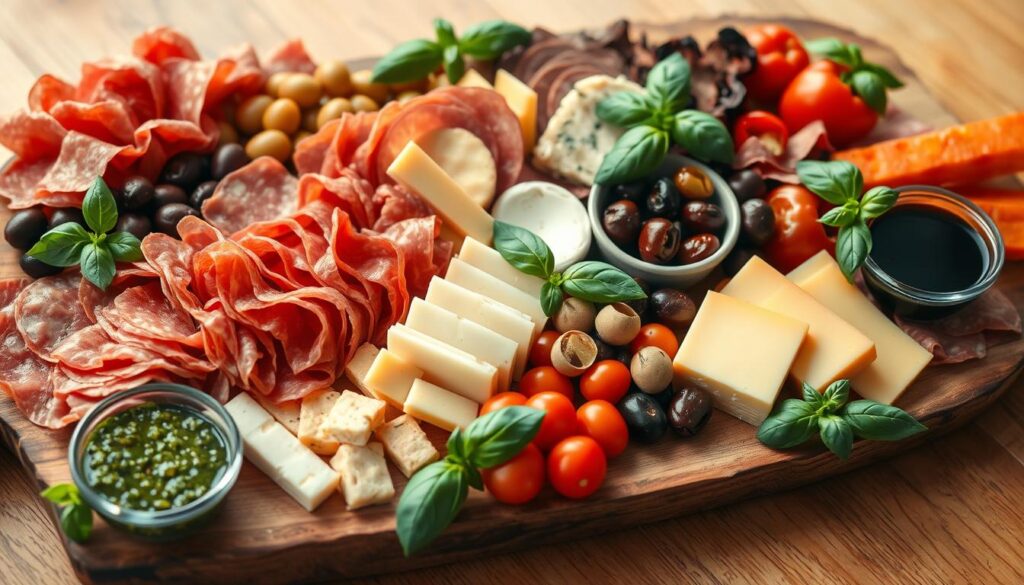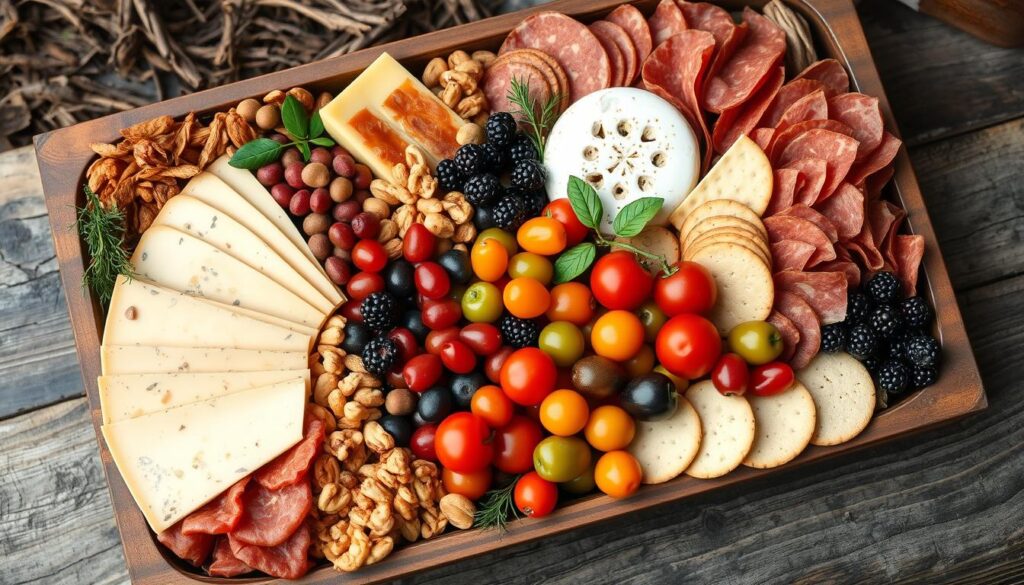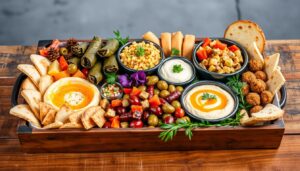As the afternoon sun shines through your office window, your stomach starts to rumble. It’s time for a satisfying and nourishing lunch. Lebanese cuisine is a perfect choice, offering delicious flavors that boost your energy.
Picture a spread of fresh hummus, tangy tabbouleh, and aromatic shawarma right in front of you. These dishes are not only tasty but also full of nutrients. They’re great for powering through the afternoon. Whether you love Middle Eastern food or are trying it for the first time, these recipes will take you on a culinary journey to Beirut.
Key Takeaways
- Discover the rich flavors of Lebanese cuisine, including hummus, tabbouleh, and shawarma.
- Explore the versatility of Middle Eastern spices and seasonings, such as baharat, sumac, and zaatar.
- Enjoy a balanced and satisfying lunch that combines protein, vegetables, and whole grains.
- Savor the vibrant colors and textures of these fresh and healthy Middle Eastern dishes.
- Elevate your midday meal with the aromatic and tantalizing flavors of the Levant region.
Introduction to Charcuterie Box Lunches
Charcuterie box lunches are a fun and different way to eat at lunchtime. They don’t need to be cooked or warmed up, making them easy for people with busy schedules. You can pick what you like, from meats and cheeses to fruits and veggies, making each meal special.
What Makes Charcuterie Boxes Unique?
Charcuterie boxes are special because they offer a mix of tastes and textures. They have everything from meats and cheeses to fruits and nuts. This makes for a tasty and beautiful meal that you can customize to your liking.
Key Ingredients for Charcuterie Boxes
- Cured meats, such as salami, prosciutto, and chorizo
- Artisanal cheeses, including soft, hard, and blue varieties
- Crackers, bread slices, or specialty picnic snack boards
- Fresh fruits, such as grapes, figs, and berries
- Nuts, olives, and pickled vegetables for added crunch and flavor
- Gourmet sandwich spreads, like pâtés, jams, and honey
With the right mix of ingredients, charcuterie boxes are a feast for the eyes and taste buds. They’re perfect for a quick snack or a full meal, offering something for everyone.
Popular Charcuterie Box Lunch Ideas
Artisanal charcuterie pairings and portable grazing boxes are now a hit for lunch. They let you enjoy different tastes and textures. This makes them a great choice for a fulfilling meal in the middle of the day.
Traditional Meat and Cheese Combinations
A traditional charcuterie box lunch includes cured meats like salami, prosciutto, or smoked turkey. It also has a variety of cheeses, like creamy brie, sharp cheddar, or tangy goat cheese. To add more flavor, you might find olives, roasted nuts, and dried fruit.
Vegetarian and Vegan Options
For those who don’t eat meat, there are plenty of tasty options. You can find hummus, roasted veggies, and plant-based proteins like edamame or tofu. There are also cheeses or dairy-free alternatives. Crackers, breadsticks, and fresh fruits like grapes and cherry tomatoes complete these boxes.
| Traditional Meat and Cheese Charcuterie Box | Vegetarian Charcuterie Box |
|---|---|
|
|
Whether you like the traditional meat and cheese or the vibrant vegetarian options, charcuterie box lunches are a treat. They’re easy to carry and look great. With so many choices, they suit many tastes.
Understanding the Charcuterie Box Concept
Charcuterie box lunches are a fun twist on the classic charcuterie board. They are small, portable platters that pack a big punch. Inside, you’ll find cured meats, cheeses, fruits, nuts, crackers, and more.
What is a Charcuterie Box Lunch?
A charcuterie box lunch is a mini version of the traditional charcuterie board. It’s made for one person and is packed with a variety of meats, cheeses, and snacks. It’s a gourmet meal in a box, perfect for eating on the go.
The History of Charcuterie Boxes
Charcuterie boxes started from the classic charcuterie boards of Europe. As charcuterie became popular worldwide, food artists made them smaller. Now, they’re great for lunches, picnics, and snacks.
| Charcuterie Box Size | Serving Capacity |
|---|---|
| 6×6 inches | 1 person |
| 8×8 inches | 2 people |
| 10×10 inches | 4-6 people |
| 12×12 inches | 8-10 people |
Charcuterie boxes are now a hit for many events. They’re loved for their looks, flexibility, and ability to please many tastes.
“Charcuterie boxes offer a portable and stylish way to enjoy a gourmet selection of meats, cheeses, and accompaniments.”
Ingredients for a Perfect Charcuterie Box Lunch
Making a tasty charcuterie box lunch is all about picking the right mix of ingredients. You need savory meats, fresh fruits, and crunchy veggies. Each part is crucial for a meal that looks good and tastes great.
Essential Proteins for Your Recipe
The heart of a charcuterie box lunch is the protein. You’ll want ham, turkey, and salami for a meaty base. Cheeses like cheddar, mozzarella, and parmesan add richness and texture.
Fruits and Vegetables That Enhance Flavor
Fresh fruits and veggies are key to balance out the meats. Berries, apple slices, and grapes bring sweetness. Cherry tomatoes, cucumber slices, and baby carrots add a fresh crunch. They make the box look good and taste even better.
| Ingredient | Quantity |
|---|---|
| Genoa salami | 4 ounces |
| Prosciutto | 3 ounces |
| Bresaola | 3 ounces |
| Hard soppressata | 6 ounces |
| Brie cheese round | 8 ounces |
| Sharp cheddar cheese | 4 ounces |
| Parmigiano Reggiano | 8 ounces |
| Blue cheese | 8 ounces |
To finish your charcuterie box, add crackers, nuts, and spreads like hummus or pesto. This makes for a complete and enjoyable lunch.

“The key to a perfect charcuterie box lunch is finding the right balance of savory proteins, sweet fruits, and crunchy vegetables.”
Step-by-Step Guide to Assembling Charcuterie Box Lunches
Preparing Your Ingredients
To make the perfect picnic snack boards or artisanal charcuterie pairings, start with the right ingredients. First, wash and slice any fresh fruits and veggies. Then, cut meats and cheeses into small, attractive pieces. Make sure to have dips and spreads ready too.
Packing Techniques for Perfect Results
Use containers with different sections to keep things neat and pretty. Place the big items like cheeses and meats first. Then, fill in the spaces with smaller things like olives, nuts, and dried fruits. This way, your lunch box looks great and tastes even better.
| Prep Time | Recommended Quantity per Person |
|---|---|
| 30 minutes | 2 to 3 ounces of cheese, 1 to 2 ounces of meat |
To make things easier, prepare your charcuterie box the night before. Store it in the fridge until you’re ready to eat. Just add fresh crackers or crostini right before you pack your lunch. With a bit of prep, you’ll have a tasty and healthy charcuterie box lunch that will impress everyone.
“Charcuterie boxes are the perfect way to enjoy a variety of flavors and textures in a single, portable meal. By carefully selecting and arranging the ingredients, you can create a visually stunning and satisfying picnic snack board that’s sure to delight your taste buds.”
Variations of Charcuterie Box Lunches
Charcuterie box lunches are more than just meat and cheese. They can be made for many tastes and events, great for both kids and adults.
Kid-Friendly Options to Consider
For kids, these lunches can include turkey, cheese, crackers, and fruit. It’s a fun and healthy way for them to try new tastes.
Gourmet Adult Versions
Adults can enjoy fancy versions with prosciutto, aged cheeses, and olives. There are also vegetarian options with cheeses, veggies, nuts, and hummus.
Charcuterie box lunches are very flexible. You can make them for kids or for a fancy lunch. The choices are endless.
“The key to crafting the perfect charcuterie box lunch is to strike a balance between familiar favorites and innovative flavors, catering to a range of palates and preferences.”
Serving Suggestions for Charcuterie Box Lunches
Make your charcuterie box lunch better with a few easy additions. Try creamy mustard or tangy fruit preserves like fig jam. They go great with the savory meats and cheeses. Add a bit of honey for sweetness.
Accompaniments That Enhance the Meal
- Creamy whole-grain mustard
- Tangy fruit preserves (e.g., fig, apricot, or berry)
- Honey for drizzling
- Crunchy nuts like almonds or walnuts
- Dried fruits like apricots, figs, or cherries
Pair your charcuterie box lunch with a refreshing drink. Sparkling water or iced tea are good choices. For a treat, try a small glass of dry white wine or rosé. It matches the rich flavors of the cheese and meats.
Pairing Drinks with Your Lunch
- Sparkling water
- Iced tea
- Dry white wine or rosé (in moderation)
Choosing the right drinks and extras can make your charcuterie box lunch special. Try different flavors to find your favorites. This way, you’ll enjoy a delightful meal every time.
“The beauty of a charcuterie box lunch is in the variety of flavors and textures. Pairing the right accompaniments can take it to the next level.”
Nutritional Benefits of Charcuterie Box Lunches
Charcuterie box lunches are now a favorite for their taste and convenience. They offer a mix of flavors and nutrients. With the right mix of spreads, proteins, and snacks, you get a meal that’s good for you.
Health Benefits of Key Ingredients
The ingredients in charcuterie lunches are packed with nutrients. Meats and cheeses give you protein for muscles. Nuts and olives add healthy fats for your heart. Fruits and veggies bring fiber, vitamins, and minerals for your health.
Balancing Your Meal: Protein, Fiber, and More
Charcuterie lunches are great because they balance your meal. They mix different food groups for a good mix of nutrients. This keeps you full and energized, helping you stay productive.
| Ingredient | Nutritional Benefits |
|---|---|
| Deli Meats | High in protein, which supports muscle growth and recovery. |
| Cheeses | Provide calcium and other essential minerals for bone health. |
| Nuts and Seeds | Rich in healthy fats, fiber, and a variety of vitamins and minerals. |
| Fresh Fruits and Vegetables | Offer a range of antioxidants, fiber, and other beneficial plant compounds. |
Choosing a variety of nutrient-rich ingredients for your charcuterie lunch makes for a healthy meal. It’s satisfying and supports your health and well-being.

Tips for Making the Best Charcuterie Box Lunches
Making the perfect charcuterie box lunches needs focus and knowing how flavors work together. Avoid common mistakes and use expert tips to impress your coworkers.
Common Mistakes to Avoid
Don’t overfill the box, as it can mess up the presentation and make food soggy. Also, mixing strong flavors with delicate ones can ruin the taste. Think about the balance of flavors and textures for a great experience.
Expert Tricks for Flavor Enhancement
- Include a variety of textures, such as crunchy nuts, soft cheeses, and juicy fruits, to stimulate the senses.
- Incorporate complementary flavors, like pairing salty prosciutto with sweet figs or tangy olives with creamy brie.
- Use small, airtight containers for wet ingredients like pickles or hummus to prevent sogginess.
- Consider themed charcuterie boxes, such as Mediterranean or Spanish-inspired selections, to add an element of discovery and excitement.
- Prepare your ingredients in advance to streamline the assembly process throughout the week.
By avoiding common mistakes and using expert tips, you can make your charcuterie box lunches amazing. Impress your coworkers with beautifully made boxes that excite their taste buds and leave a memorable mark.
Popular Sides for a Complete Charcuterie Box Meal
To make a charcuterie box lunch complete, add some tasty side dishes. These can include grain-based salads and fresh green salads. They turn your lunch into a full and healthy meal.
Grain-Based Salads
Enhance your charcuterie box with grain-based salads. Try quinoa or couscous salads with fresh herbs and veggies. They offer a nice contrast to the meats and cheeses, adding fiber and nutrients.
Fresh Green Salads to Serve Alongside
A fresh green salad is great with your charcuterie box. Choose arugula, spinach, or mixed greens. Dress them lightly with vinaigrette or lemon. These salads add crunch and freshness, balancing the meal’s flavors.
Adding these sides makes your charcuterie box a full and healthy lunch. Try different salads to find the best match for your deli meats and cheeses.
Dessert Ideas to Complement Your Charcuterie Lunch
Make your charcuterie box lunch even better with sweet treats. The savory items are the main attraction, but a good dessert can round out the meal. It adds a nice balance of flavors, leaving you feeling complete.
Sweet Treats for Your Box
Try adding dark chocolate squares, mini cookies, or a small slice of creamy cheese with honey. These small sweets contrast nicely with the savory items. They mix flavors and textures in a delightful way.
Fruit-Based Desserts for a Lighter Option
For a light dessert, add fruit to your charcuterie box. A fruit salad with berries, apples, or grapes cleanses your palate. Or, try dates filled with almond butter for a sweet treat.
Balance and variety are key to a great charcuterie box lunch. Sweet treats can make the experience even better. Experiment with different flavors and textures to find the perfect match for your antipasto and sandwiches.
Conclusion: Enjoying Your Charcuterie Box Lunch
Charcuterie box lunches are a fun and creative way to eat at midday. They let you mix and match flavors to suit your taste and dietary needs. Sharing your charcuterie box with coworkers can spark conversations and make lunchtime more exciting. These meals are more than just food; they bring a touch of gourmet dining to your daily routine.
Celebrating Variety Through Food
Charcuterie box lunches are versatile and appealing. You can choose from a variety of meats, cheeses, fruits, and spices to make your own unique snack boards. Trying out different combinations lets you enjoy the flavors of each ingredient and create a special dining experience.
Sharing Your Creations with Colleagues
Sharing your charcuterie box with coworkers can be a great way to bond and inspire. Talking about the different parts, tastes, and how to present them can deepen your appreciation for charcuterie. These meals can lead to interesting conversations, making work more enjoyable and collaborative. By sharing your love for these gourmet snacks, you can encourage others to try new things and explore the world of charcuterie.

